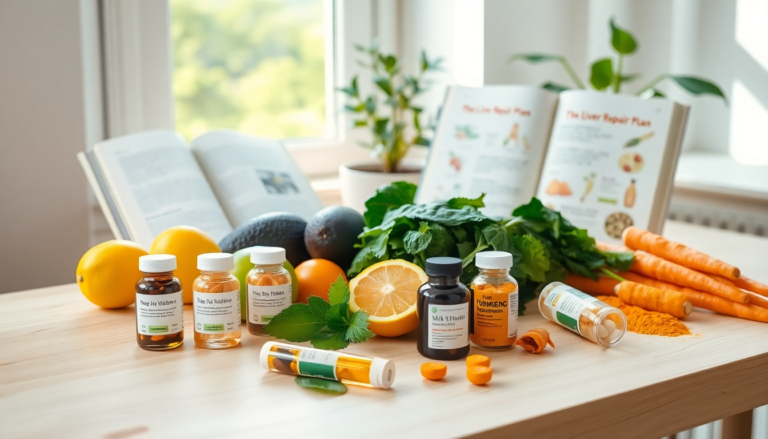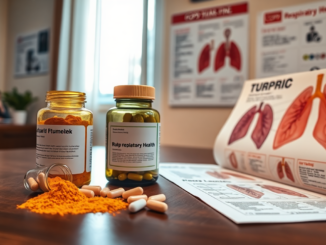Uncover the vital role of your liver and how to keep it healthy with essential vitamins and lifestyle changes.

Topics covered
The liver is the unsung hero of our bodies. It works tirelessly, managing a multitude of tasks that are vital for our well-being. From processing nutrients to regulating hormones, this powerhouse organ plays a pivotal role in weight management, digestion, and even immunity.
Clinical nutritionist Sarah Di Lorenzo, author of “The Liver Repair Plan,” stresses that a healthy liver is foundational to achieving health goals. When liver function falters, the repercussions ripple throughout the entire body.
The liver’s role in health
Imagine the liver as your body’s control center.
It’s not just about detoxifying; it dictates numerous metabolic processes. Di Lorenzo aptly points out, “If your liver is not well, then your entire body will know about it.” Weight loss, energy levels, skin health, and even mood can plummet when the liver is struggling.
The connection is clear: a sluggish liver can stall your path to wellness.
Many individuals report that once they prioritize liver health, they notice weight loss and improvements in mood, energy, and skin vitality. It’s a transformative process. Di Lorenzo’s book details how to enhance liver function through dietary choices and specific supplements.
The power of vitamins and minerals
Vital for liver function are the B vitamins. These nutrients are crucial in alleviating symptoms associated with liver disease. Deficiencies in B1, B6, and B12 can exacerbate liver problems. For instance, B12 is stored predominantly in the liver. When liver health declines, so do these stores, leading to potential anemia and impaired memory. B vitamins, particularly B6 and B12, also play a role in reducing inflammation.
Vitamin C is another heavyweight in liver health. As a powerful antioxidant, it combats free radicals and prevents fat accumulation within the liver. Insufficient levels of antioxidants can lead to oxidative stress, paving the way for liver disease. Vitamin D also deserves mention; it helps curb inflammation and is often deficient in those with chronic liver issues.
- B vitamins: Support overall liver metabolism.
- Vitamin C: An antioxidant that protects liver cells.
- Vitamin D: Crucial for reducing chronic liver inflammation.
Why coffee is your liver’s best friend
It might come as a surprise, but coffee lovers have a reason to celebrate. Studies indicate that coffee consumption can significantly lower the risk of liver cancer and disease. Di Lorenzo highlights, “Drinking coffee reduces your risk of liver cancer as well as liver disease.” Just remember, it’s the coffee itself that provides benefits—adding sugar or cream can negate these effects.
Regular consumption of coffee can prevent fat buildup in the liver and boost antioxidant levels, particularly glutathione, which fights cell damage. Those who indulge in coffee also show lower levels of abnormal liver enzymes, a marker of liver distress.
Maintaining a balanced approach with supplements
While supplements can aid liver health, they should be approached with caution. Di Lorenzo emphasizes the importance of reviewing medications and supplements regularly. Over-reliance on certain medications can put additional strain on the liver. For example, many individuals remain on antidepressants or other long-term medications without reassessing their need.
Some supplements, particularly those claiming to detoxify the liver, often contain questionable ingredients like milk thistle or dandelion root. Research supporting their efficacy is lacking. Instead, focus on maintaining a balanced diet and lifestyle.
Key supplements for liver health
For those considering supplements, Di Lorenzo recommends several that are beneficial for liver function:
- B vitamins: Essential for liver metabolism and repair.
- Choline: Prevents fat accumulation in the liver.
- Coenzyme Q10: Supports cellular energy and reduces inflammation.
- Glutathione: Protects against liver damage and supports detoxification.
Moreover, turmeric’s active compound, curcumin, showcases strong anti-inflammatory properties and can reduce liver enzyme levels. It’s worth noting that while Vitamin E has benefits, prolonged use as a supplement may lead to insulin resistance, thus should be approached judiciously.
Embracing lifestyle changes
Ultimately, the best path to a healthy liver involves a holistic approach. Regular exercise, balanced nutrition, and maintaining a healthy weight are pivotal. Incorporating antioxidant-rich foods like fruits, vegetables, and nuts can bolster liver function.
It’s clear that the liver is more than just a detox organ. It’s central to our overall health. Understanding its needs and prioritizing liver care can lead to profound improvements in our health journey. As Di Lorenzo aptly notes, focusing on liver health can catalyze positive changes throughout the body.




